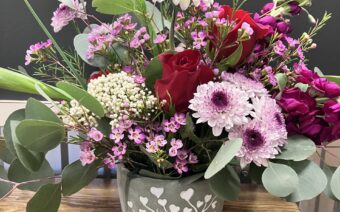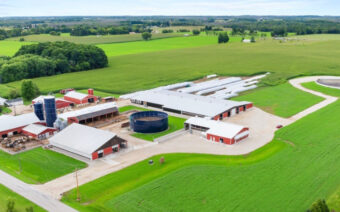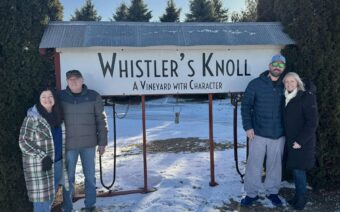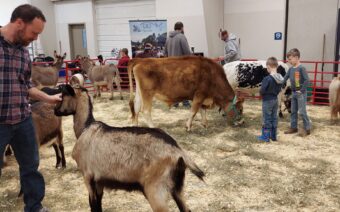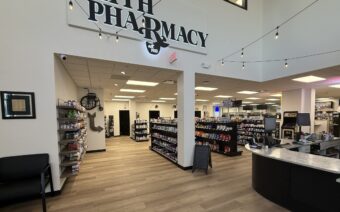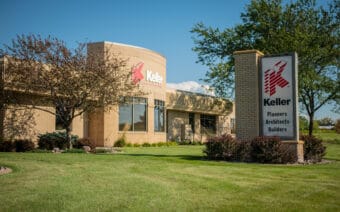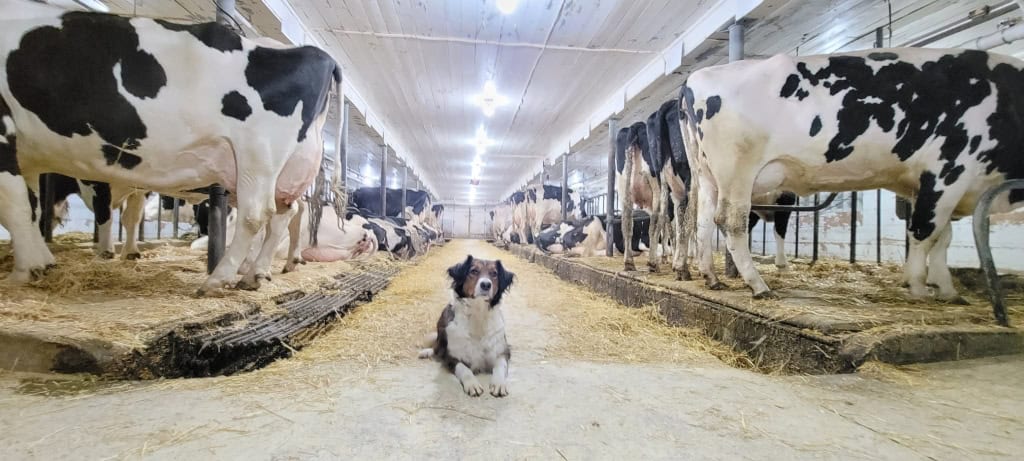
September 8, 2025
BRUSSELS – Austin Vandertie said he knew he wanted to be a farmer from the moment he first rode a tractor with his dad.
Now, the third-generation farmer at Vandertie’s Doorco Farms has been named a finalist for the Wisconsin Farm Bureau Federation’s (WFBF) Young Farmer and Agriculturist (YFA) Farming for the Future award.
He is one of four finalists vying for top honors, with the winners to be announced at the annual WFBF YFA Conference in December.
The Farming for the Future Award – per wfbf.com – recognizes YFA members who excel in their farm involvement, future goals, leadership abilities and participation in farm bureau and other civic and service organizations.
Applicants must derive a majority of their income from on-farm production.
Vandertie said he received a postcard in the mail notifying him of the nomination.
“I suspect the nomination had something to do with volunteer service to the community, along with some of the more progressive things we do on the farm with regenerative farming,” he said.
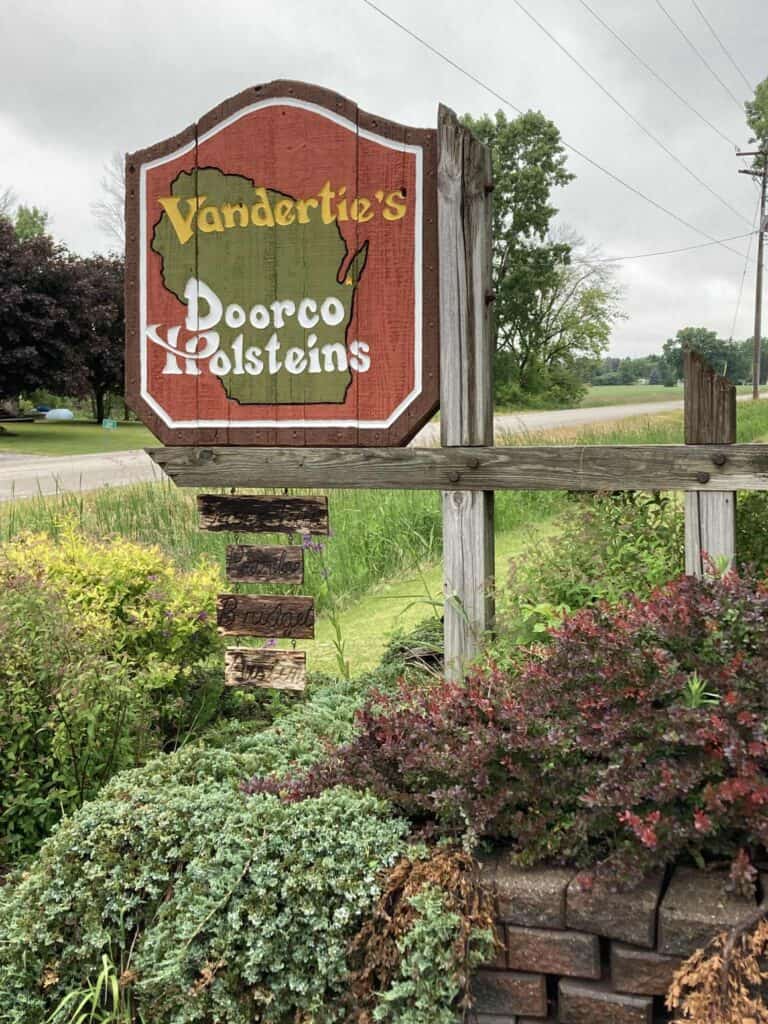
Farming runs deep
Following the path laid by his dad and grandpa, Vandertie said farming is in his blood.
“It takes a team [to run the farm] – from my parents to me, to our accountant for tax purposes, along with our lawyer,” he said. “It’s been a multi-year process to make the [ownership] transaction beneficial to me, but also beneficial to my parents because at the end of the day, they need to be able to retire on [the proceeds of the sale of the farm].”
As the new owner of Vandertie’s Doorco Farm, he said he proudly refers to himself as both farmer and farmhand.
Daily life on the farm, Vandertie said, is busy.
“We milk 40 cows daily, and we also focus on the genetics side of farming,” he said. “All of our animals are registered with the Holstein Association. We raise all of our own young stock here – everything from calves that are just born here that grow to heifers to bulls. We also run about 400 acres of cropland, with about half of the harvest going toward feeding our animals for the year and the other half being cash crop.”
Vandertie said he has always dreamed of running the farm, though that didn’t stop him from furthering his education – earning a bachelor’s degree in dairy science from the University of Wisconsin-Madison.
“There was never really a time when I thought I didn’t want to run the farm,” he said. “When I went to college, it reaffirmed that this is what I want to do.”
Vandertie said many of his fellow Badger classmates didn’t have plans to return to their family farms after graduation like he did.
“There were maybe a handful of us, but most of [my classmates] were going on to be consultants or planned to do something [else] within the agriculture industry,” he said. “There are a multitude of jobs out there that could still keep someone tied to the ag industry, [some that were] a lot easier than working on a farm.”
For Vandertie, however, he said there was never a question – noting that he couldn’t imagine doing anything else with his life.
He said a story of him on the tractor – something of a family legend – has long supported his future career.
“I was too young to remember it, but my dad says it, so it must be true,” he said. “I was riding on the tractor with him as a little guy toward the Town of Brussels, behind the houses. And Dad said, ‘One day this could all be a subdivision and houses.’ I [must have] gotten really quiet for a few minutes, and then I said, ‘Well, where do I get the feed to feed the cows?’”
From that day on, Vandertie said he was committed to protecting the farm and its legacy – whether he knew it at that point or not.
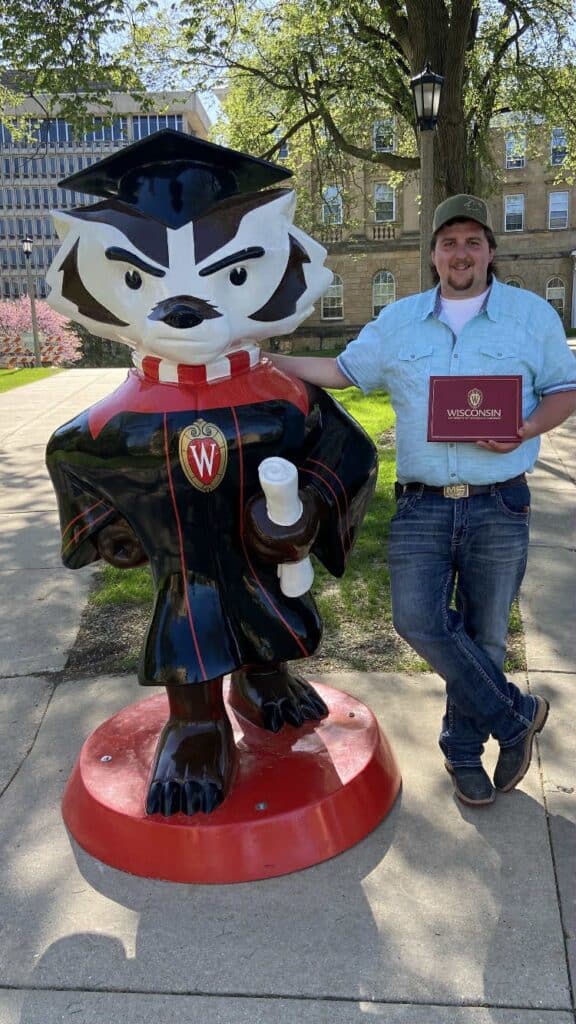
Legacy meets innovation
Part of that commitment, Vandertie said, meant adapting and finding new ways to sustain the family’s land and livelihood – which he’s been able to do by exploring innovative approaches to growth.
“The way we breed cows is we focus on cow families, not necessarily just numbers,” he said. “That market went away from us a little bit, and I’m starting to find more of a niche market with those who are interested in those cow families. I was able to sell embryos to [other farmers] earlier this year, so I’m really focused on that and creating another source of income for the farm.”
Sustainability, Vandertie said, also factors into that success equation and is something that Vandertie’s Doorco Farms focuses on every day.
He said one of the biggest challenges all farmers face – regardless of location or size – is learning how to respect and care for the land.
“This isn’t really an issue that’s specific to us, but it’s an issue that affects all farmers,” he said. “[Being sustainable] should be at the forefront of every farm. If I don’t do a good job with what I have here and put stuff back into the land and back into the soil, there’s going to be nothing left for the next generation.”
Vandertie said for him, success isn’t just about productivity or profit – it’s about honoring the legacy of those who came before him and ensuring something is left for those who come next.
“My definition of success has to echo what my grandpa and my dad have done all of these years,” he said. “I want to be able to hand down the farm to the next generation, whether it’s my kids, or if I don’t have kids, or if they’re not interested, to be able to hand the farm to somebody else and give them the same opportunity I have.”
Vandertie said the farm has already taken major steps to reduce its environmental impact.
“We just built a new heifer barn and a new manure storage, which will greatly mitigate our potential for polluting,” he said. “The farm is currently located in a lower-lying area. Our new heifer barns and manure storage are built higher and are engineered to improve runoff.”
Vandertie said the five-year plan includes building a robotic milking bar.
Vandertie said he gives a lot of credit to his parents for keeping up with the times – adapting to new farming methods and following the guidance of industry experts and educators.
This is particularly true, he said, when it comes to producing a safe product.
“For example, [our farm’s practices] include milking, treatment protocols and wearing gloves to produce a really safe product – [these are] just some of our practices,” he said.
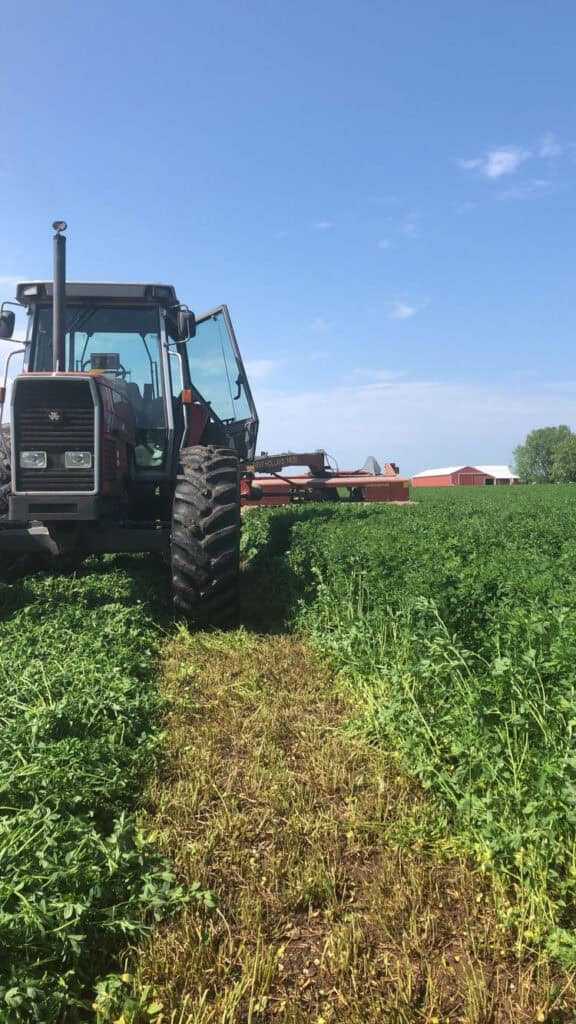
Building upon that, Vandertie said his degree provided valuable knowledge in specific areas of dairy farming, particularly in cattle management and reproduction.
“The greatest benefit I got from going down to Madison, however, was the connections…,” he said. “I still use those college connections every single day.”
Vandertie said there isn’t a day that goes by when he’s not reaching out to one of his buddies – whether it’s an agronomist or a specialist in cattle reproduction – to discuss protocols and best practices.
“The connections and friends I made in college are priceless,” he said. “We share this common bond, and keeping these connections is so important.”
Community proud as well
Beyond agriculture, Vandertie said he dedicates time to his community as a firefighter with the B.U.G. Fire Department – joining when he was 17.
“There is such a demand for help, especially during the day when many of the volunteers are working their day jobs,” he said. “Anywhere you go in rural United States, there is a struggle to find staff during the day for emergency services.”
Vandertie said those numbers decrease even more as more people leave the rural areas to work in larger nearby cities.
“I work with a couple of buddies along with my dad,” he said. “[Because of this need for volunteers], we put together a program that merged the fire department with local high school students to get kids interested in becoming volunteer firefighters. [As a result], there are now a half dozen individuals who have joined the department in the last five years.”
Since the fire department and emergency medical responders (EMR) work closely together, Vandertie said he took classes to become an EMR.
 Paving the way for the next generation of truck drivers
Paving the way for the next generation of truck drivers Solar helps power care at Emplify’s Children & Adolescent Center
Solar helps power care at Emplify’s Children & Adolescent Center


